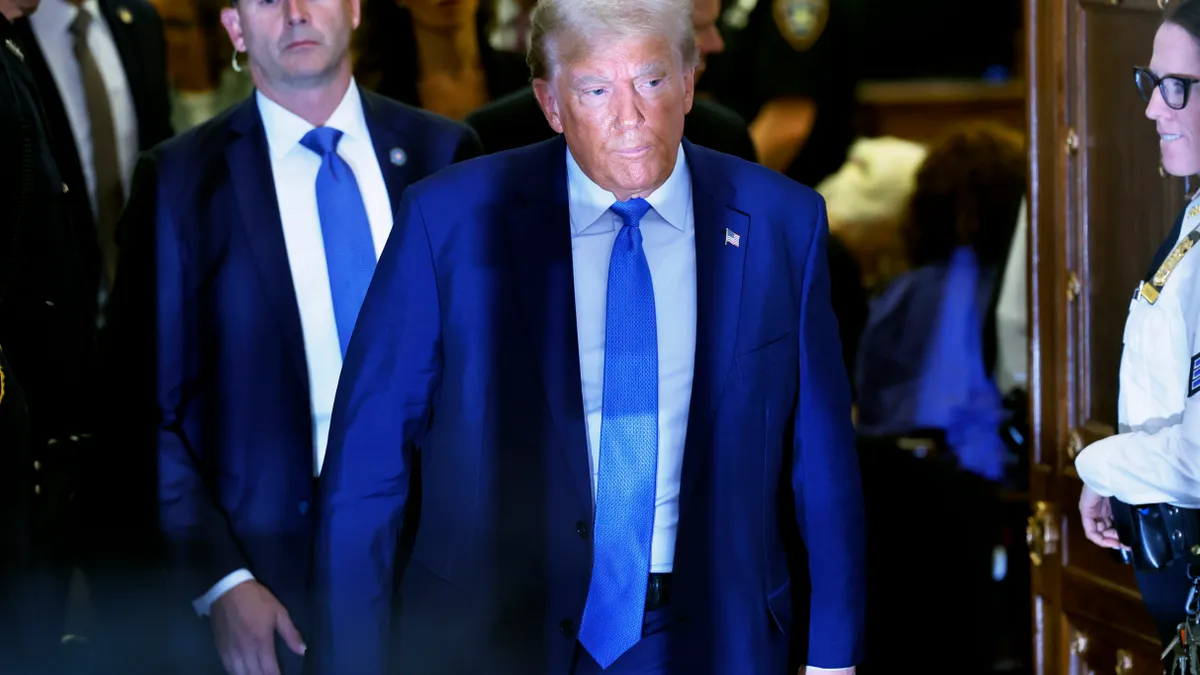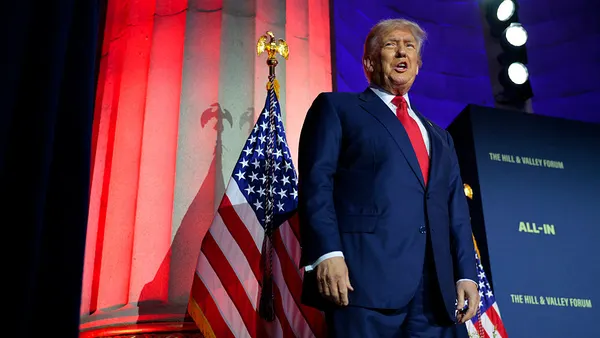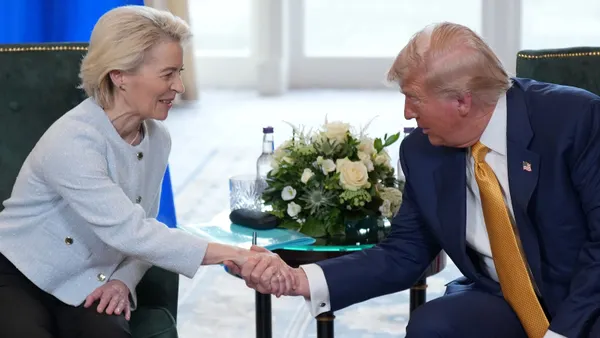Dive Brief:
- Former President Donald Trump testified Monday in the New York Attorney General’s $250 million civil fraud case against him, downplaying the importance of his company’s annual financial statements and saying the former Trump Organization ex-CFO Allen Weisselberg, former controller Jeff McConney and the company’s former outside accountants were primarily responsible for preparing them.
- Taking the stand wearing a suit and blue tie rather than his signature red, Trump initially spoke calmly, hands clasped in his lap but he began periodically folding his arms and gesticulating with his hands as his exchanges under questioning from Kevin Wallace, a lawyer for the NY AG’s office, grew more heated as the day wore on. At one point Trump called out Judge Arthur Engoron for his ruling that found the defendants liable for fraud before the bench trial began and separately he called the case a “disgrace.”
- Under questioning Trump also reiterated his previous assertion that disclaimers in the financial statements made clear that valuations were not to be relied upon, asserting that banks knew that. “Probably the statements were good,” Trump testified. “Again if there was a mistake it was non-material but we have a disclaimer clause that says do your own work don’t, under any circumstances, count on anything here.” Pressed as to whether Weisselberg and McConney did a “good job” preparing the statements by Wallace, Trump was lukewarm in his support. “I don’t know, but I think so,” Trump said during afternoon testimony.
Dive Insight:
Trump, now the leading Republican prospective nominee for president, was a long-anticipated star witness in New York Attorney General Letitia James’ civil fraud case against him. The trial, now stretching into its second month, alleges that Trump, along with his two adult sons and senior executives including Weisselberg, falsely inflated his net worth by billions of dollars to secure bank loans and insurance for the Trump Organization on more favorable terms than would otherwise have been available.
Trump, who has denied any wrongdoing and who has previously derided the case as a political “witchhunt,” also attacked the judge and James while on the stand. The barbs came just days after the judge, in a written ruling Friday, widened his previously issued gag order to the court’s attorneys, prohibiting future comments surrounding confidential communications between himself and his staff.
Indeed the singular stature of Trump was noted by his attorneys after Engoron asked the defense attorneys to keep Trump “under control.” Trump’s attorney Chris Kise said he should be given some latitude to speak, especially since he was the former president and potentially the next president of the United States.
Thoroughout the day Trump was asked repeatedly about the financial statements, but he maintained that if they erred in any way it was by undervaluing his company — that they were conservative. “The overall value is actually billions more than the statement,” Trump said. At several points, Trump also launched into a description of disclaimers, with the judge interjecting that Trump stay on track in answering questions, and that if he wanted to learn about the disclaimers Trump should read Engoron’s ruling, “again, or for the first time.”
An angered Trump turned to look at Engeron and responded testily. “He ruled against me without knowing anything about me,” Trump said, pointing his finger at the judge.
Before the bench trial began, Engoron in September ruled that the AG’s office had established that Trump and the other defendants were liable for fraud, specifically using fraudulent documents that inflated the value of many of Trump’s signature real estate assets by as much as $2 billion.The trial will determine what if any penalties will be paid and whether Trump will be barred from doing business in the state.
But while Trump asserted that courts uphold the protection that disclaimers provide, Jack Castonguay, an assistant professor of accounting at New York’s Hofstra University who is following the trial, said disclaimers do not leave executives off the hook if the financial reporting is not done in good faith.
“Disclaimers usually indicate estimates are subject to subjective assumptions, models, and inputs..You can't disclaim purposefully inaccurate information or fraud. Management can certainly be held to account if their valuations are intentionally inaccurate or aren't made in good faith,” Castonguay said in an emailed response to questions from CFO Dive.
The state AG’s office said its last witness will be Trump’s daughter Ivanka Trump who is set to testify Wednesday. The trial is expected to continue through mid-December. However, Trump’s attorneys indicated after Trump finished testifying Monday that they would likely file a request to declare a mistrial.














